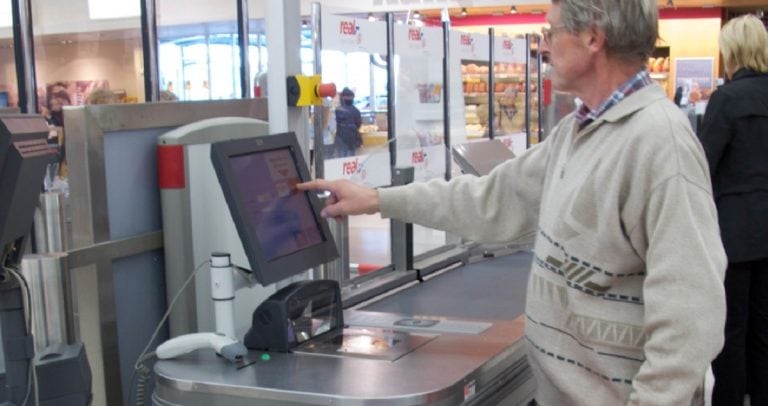
KJIPUKTUK (Halifax) – Among many new technologies infiltrating Canadian workplaces, the self-checkout machine is perhaps the most visible and controversial.
Self-checkout machines made their first appearance in the early 1990s, and are now a fixture in many major retail stores. In 2016, according to CBC, there were 255,000 self-checkout machines in stores internationally. By 2022, this number is expected to exceed 400,000.
These machines are becoming more prevalent in Nova Scotia as well. Over the last couple of years, customers here have witnessed a sharp increase in self-checkout technology, including at Atlantic Superstores and Shoppers Drug Marts; two of the province’s largest private sector employers.
Many Canadian customers avoid self-checkouts because of what it means for vulnerable workers. “They kill jobs,” says Hailie Tattrie, Halifax resident and organizer with the Fight for $15 and Fairness campaign. “How can a cashier earning minimum wage compete with a machine that will do the same thing for free?”
Some feel that self-checkout technology is a corporate attempt to combat marginal minimum wage increases. On April 1st, 2019, Nova Scotia’s minimum wage increased from $11.00 to $11.55/hour which, according to a recent report by the Nova Scotia chapter of the Canadian Centre for Policy Alternatives (CCPA), is still almost $8.00/hour less than a liveable wage in Halifax.
“Cashiers in Nova Scotia shouldn’t be punished with the threat of unemployment for a mere .55 cent raise,” says Tattrie. “Living off of minimum-wage is hard enough as it is.”
Even from a consumer standpoint, the ethics behind self-checkout technology is questionable. Disguised as a customer service initiative, the machines transfer the cost of paid labour onto paying customers.“They aren’t there to benefit shoppers,” Tattrie says. “Those who use them are essentially paying for the privilege of working for free.”
Beyond the ethical questions they raise, many customers are left frustrated by the self-checkout experience. “Oftentimes, the machines won’t work or scan properly,” says Tattrie. “You end up requiring intervention from the few workers on staff anyways.”
Additionally, while some self-serve purchases can be completed quickly by scanning a barcode, others are more complex. “I wouldn’t know how to apply a discount by myself,” says Tattrie.
Identifying produce correctly can be difficult for unassisted customers, as well. There are often organic and non-organic variations of the same vegetable, for example. “People should be paid to make these kinds of distinctions,” Tattrie insists. “Now, this responsibility is being imposed onto untrained shoppers.”
For older generations, self-serve checkouts can be even more burdensome. “Older customers may lack the skills needed to operate these machines at all,” says Tattrie. “They may require more assistance, which can delay things further, especially with reduced staffing levels. This may lead to feelings of exasperation and even embarrassment.”
By reducing opportunity for human contact, some feel that customer service is further compromised. “Given the choice, I will always prefer a brief, human interaction and a smile,” says Tattrie. “Standard checkouts allow customers to have meaningful conversations with workers, which can improve the experience for both parties.”
The ethical concerns raised by the machines, along with the challenges they pose for customers, seem to be impacting their popularity. A 2018 grocery shopping study conducted by Dalhousie University found that, out of the 1,053 Canadians surveyed, only 11 percent use the machines regularly. Over 25 percent of the study’s participants claimed to never use self-checkouts, even for small purchases. For these reasons, some stores (including several Canadian Tire locations across the country), have eliminated their self-checkout option.
The long-term use of self-checkouts may lead to broader social consequences. When a machine replaces an employee, a tax opportunity is lost. “Unlike workers, self-checkout machines aren’t paying taxes. They aren’t spending money. They aren’t contributing anything to society,” says Tattrie.
Strong critics of self-checkout technology are calling for regulation. To make-up for lost tax revenue, some are suggesting a tax be imposed on the businesses that use them. This may discourage their use by retailers, and help keep cashiers employed.
Unions in Atlantic Canada have become engaged in the debate as well. Unifor, the union representing workers at Dominion grocery in Newfoundland, is in favour of abandoning of self-serve checkouts. “People need to work,” said Lana Payne, Unifor’s Atlantic director in an interview with CBC. “We need to have an economy with decent jobs in it so people can provide for their families.”
See also: Lisa Cameron: In Nova Scotia employers can demand sick notes for no good reason
With a special thanks to our generous donors who make publication of the Nova Scotia Advocate possible.
Subscribe to the Nova Scotia Advocate weekly digest and never miss an article again. It’s free!




It will be a cold cold day before I touch one of those things. I have left items on the belt of a closed checkout and exited a store when confronted by no staffed cash lanes and just these things. This will continue to be my practice as I refuse to use the self things. Period.